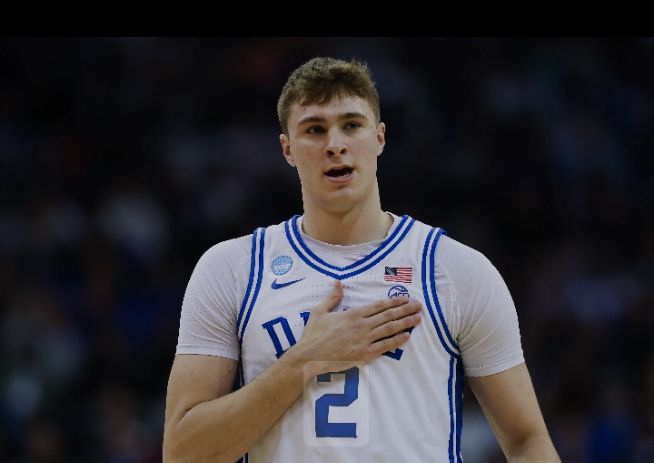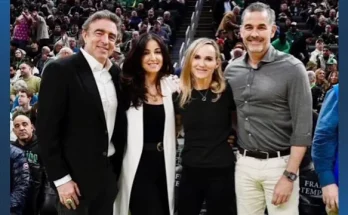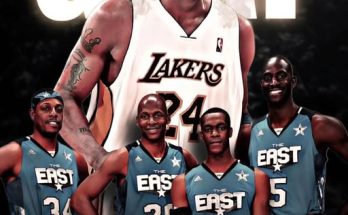Cooper Flagg stood in the center of Cameron Indoor Stadium one last time, the echoes of a season that captured the hearts of Blue Devils fans ringing in his ears. With his declaration for the 2025 NBA Draft now official, the 6-foot-9 phenom from Maine is closing a remarkable chapter—one filled with passion, triumph, and deep-rooted gratitude for a university that became more than just a stop on his path to the professional ranks. It became a home.
“To the Blue Devils Family, from the bottom of my heart, I want to say thank you,” Flagg wrote in his heartfelt message. “Choosing to declare for the 2025 NBA Draft was not an easy decision, and it came with a wave of emotions. But through it all, one thing remained constant—the unconditional love and support.”
It’s rare that a player enters college basketball with the kind of fanfare Flagg did—and even rarer that he exceeds it. From the moment he donned the blue and white, he carried the burden of expectations that would crush most. The comparisons to Duke legends like Zion Williamson, Jayson Tatum, and Grant Hill weren’t just flattering—they were benchmarks that many outside the program demanded he reach. Flagg not only met them, he redefined what greatness looked like in a single season.
The numbers were dazzling: 21.2 points per game, 9.6 rebounds, 3.1 assists, and 2.7 blocks. But Flagg’s legacy is not about box scores. It’s about the relentless energy he brought every night. The chase-down blocks that ignited Cameron. The clutch shots that silenced road crowds. The selflessness on the court, the leadership off it. In a program defined by excellence, Flagg found a way to stand out—not through flash, but through fire.
Still just 18 years old, Flagg displayed a level of maturity that belied his age. He embraced the tradition of Duke basketball while forging his own identity within it. His teammates described him as a “warrior,” his coaches called him “wise beyond his years,” and fans simply called him “the future.” But now, that future lies in the NBA, and while the Blue Devils faithful knew this day would come, it doesn’t make the farewell any easier.
Flagg’s decision, though expected, was never a foregone conclusion. In recent weeks, there had been whispers that he might stay one more year. He reportedly turned down multiple NIL offers worth more than $7.5 million from programs like Notre Dame and Georgia before ever suiting up for Duke, reaffirming his commitment to Coach Jon Scheyer and the school that believed in him from the start. For Flagg, loyalty was never negotiable. Nor was the bond he formed with the Brotherhood—a bond he says will never be broken.
“I gave everything I had to this program,” Flagg said. “From the first day I stepped on campus, I felt the love. Duke isn’t just a school. It’s a standard, a responsibility, and an honor. I came here to grow—not just as a player, but as a person. And I’m leaving knowing that I’m better in every way because of it.”
Those who watched Flagg closely this season saw that growth unfold in real time. There were early struggles—tough shooting nights, foul trouble, the grind of the ACC schedule. But Flagg never wavered. He studied film with intensity, took responsibility in postgame pressers, and carried himself like a seasoned vet. By March, there was no denying it: Cooper Flagg was the best player in college basketball.
His dominance in the NCAA Tournament was the stuff of legend. A 32-point, 12-rebound performance against Kansas in the Sweet 16. A game-winning block and assist in the Elite Eight. And though Duke ultimately fell short in the Final Four, Flagg’s heroics earned him the respect of an entire nation. He wasn’t just the top prospect—he was the heartbeat of the team.
Yet for all the accolades—the ACC Player of the Year, the Wooden Award, the All-American nods—Flagg remains most proud of the relationships he built. He speaks glowingly of his teammates, many of whom he now calls brothers. He credits Coach Scheyer with challenging him in ways that prepared him for the next level. And he never misses a chance to mention the Cameron Crazies, who showed up every night, rain or shine, to lift him higher.
“Every time I walked into that building, I felt something bigger than basketball,” Flagg said. “There’s nothing like Cameron. Nothing. You can feel the history, the passion. It’s sacred ground. And to be part of that, to add my name to that story—it means everything to me.”
Flagg’s story at Duke is not just a tale of talent—it’s a testament to the power of culture. At a time when the transfer portal and NIL landscape have changed college basketball dramatically, Flagg represented something refreshingly pure: a commitment to tradition, to hard work, and to legacy. He could have taken the easier route, chosen flash over fit. But he chose Duke because of what it stood for—and in doing so, he elevated both himself and the program.
His departure leaves a sizable void, but also a blueprint. Future Blue Devils will look to Flagg’s example—not just for how to play, but for how to lead, how to give back, how to embrace the moment. The standard he set will endure long after he’s gone.
As for what’s next, the NBA is waiting—and waiting eagerly. Flagg is widely projected to be the No. 1 overall pick in the 2025 draft, a franchise-altering player who can anchor a team on both ends of the court. Scouts rave about his instincts, his versatility, his motor. They see a two-way superstar in the making, a player who can change the direction of an organization from Day 1.
But even as he prepares for that next step—pre-draft workouts, interviews, the whirlwind of the draft combine—Flagg remains grounded. He knows what got him here, and he’s not forgetting it.
“I’m ready for what’s ahead,” Flagg said. “But I’ll never forget what I’m leaving behind. Duke gave me everything—confidence, clarity, and a second family. I’ll carry that with me wherever I go.”
His journey is far from over. In fact, it’s just beginning. But for a brief, brilliant window, Cooper Flagg belonged to Duke. And Duke, in turn, belonged to him. They lifted each other, challenged each other, completed each other. And in doing so, they reminded us why college basketball still matters—why it still has the power to inspire.
As the lights dim on Flagg’s time in Durham, one truth shines brighter than ever: Cooper Flagg didn’t just play for Duke. He left a legacy there.
And now, with the world watching, he’s ready to write the next chapter.


